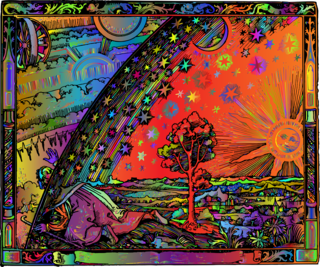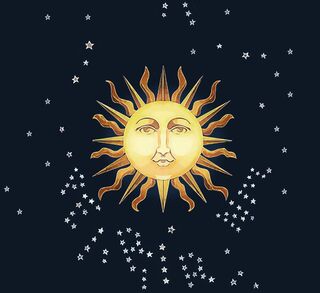Narcissism
Who Believes in Astrology? The Odd Role of Narcissism
Astrology belief is surprisingly linked to both narcissism and agreeableness.
Posted December 29, 2021 Reviewed by Davia Sills
Key points
- Many people believe in astrology, despite there being no evidence that it can accurately predict a person's life choices or future outcomes.
- Research suggests that people who are high in narcissism are more likely to believe in astrology, possibly to confirm their own specialness.
- The trait of agreeableness has also been linked to a belief in astrology.
Discredited forms of knowledge remain popular.
Belief in astrology remains widespread, despite considerable evidence that it is scientifically unfounded. Many people base important life decisions, such as who to date, on astrological principles. However, a study in Sweden that looked at records of marriage and divorce in over 500,000 individuals from 1968 to 2001 found no evidence that the compatibility of a couple’s star signs had any effect on whether they stayed married or eventually divorced (Helgertz & Scott, 2020).
Research has examined numerous factors that may help explain why some people believe in unfounded ideas like astrology. A recent study looked at personality and intelligence and made the novel discovery that people who believe in astrology tend to be more narcissistic (Andersson et al., 2022). Surprisingly, the study also found that believers also tended to be higher in agreeableness, despite there being an inverse relationship between narcissism and agreeableness.

Using a survey of 264 people recruited via Facebook, Andersson et al. asked respondents eight questions about their belief in astrology and an additional question about whether they thought astrology is supported by scientific research, as well as asking them to complete measures of the Big Five personality traits, a short measure of narcissism, and an intelligence test based on visual-spatial reasoning. Belief in astrology was positively correlated with believing that it is scientific, higher openness to experience, agreeableness, and narcissism, and lower intelligence. To test which of these factors related to a belief in astrology were most important, they ran a statistical model comparing all of these factors, as well as age and sex, at once. This model showed that belief in astrology was associated with each of the following: female sex, being older, belief that astrology is scientific, higher levels of both agreeableness and narcissism, and lower extraversion and intelligence. (Openness to experience was no longer a significant factor in the model.)
Narcissism and the belief that astrology is scientific were the two strongest factors in the model. It is important to note that in this model, each factor was related to astrology belief independently of the other factors: e.g., someone high in narcissism would be more inclined to believe in it regardless of whether they were high or low in intelligence, agreeableness, and so on.
The surprising roles of both narcissism and agreeableness
Many previous studies have found that women are more likely than men to believe in astrology (e.g., Allum, 2011; Bauer & Durant, 1997; Gecewicz, 2018) as well as paranormal and magical phenomena more generally (Ward & King, 2020), which is consistent with the findings of Andersson et al.’s survey. Furthermore, their finding that belief in astrology is associated with lower intelligence is comparable to findings that scientific literacy (both the ability to explain what makes something scientific and to correctly answer factual questions about science) was negatively correlated with a belief that astrology/horoscopes are scientific (Allum, 2011). However, that narcissism and agreeableness were each independently associated with astrology belief appears to be a novel finding.
Narcissism is associated with a grandiose sense of self and belief in one’s superiority to others. Andersson et al. suggested that astrology might appeal to narcissists because it is self-focused and may enhance one’s sense of uniqueness; hence, their sardonic statement, “Even the stars think I am superior.” This might be because narcissists think astrology grants them special knowledge that most people don’t have or confirms that they have some special relationship with the cosmos.

Andersson et al. found that narcissism in their sample was inversely associated with agreeableness, which is in line with previous research (O’Boyle et al., 2015). Agreeableness is a prosocial trait that is associated with concern for others, helpfulness, and kindness. I, therefore, find it intriguing that it too was positively associated with a belief in astrology.
Previous research has found that agreeableness is often associated with spiritual and religious inclinations. For example, one study found that among the Big Five traits, agreeableness was the strongest predictor of a measure of existential spirituality (e.g., “I see life as a journey toward fulfilment”) (Chang et al., 2015). Another study found that people who rated themselves higher in “spiritual intelligence” (e.g., belief that they could influence others spiritually) tended to be higher in agreeableness (Furnham & Buchanan, 2005). Studies have also found that belief in astrology is associated with religious belief (e.g., in God or some kind of spiritual presence) (Allum, 2011; Bauer & Durant, 1997); hence, people high in agreeableness who are religious might find astrology compatible with their worldview.
Contrasting pathways to an irrational belief?
The fact that opposing aspects of personality, such as narcissism and agreeableness, are each independently associated with a belief in astrology suggests that a nuanced understanding of who believes in the subject may be in order. That is, people might believe in it for a variety of different and opposing reasons. Some people might find it appealing because it enhances their sense of egotism and specialness, while others might be drawn to it because they see it as an avenue to spiritual knowledge. Hence, rather than there being one common profile of a typical astrology believer, it may be more likely that believers tend to sort into diverse subtypes, depending on what factors incline them to believe in such a subject, despite it being scientifically unfounded. This could be a fruitful topic for future research.
References
Allum, N. (2011). What Makes Some People Think Astrology Is Scientific? Science Communication, 33(3), 341–366. https://doi.org/10.1177/1075547010389819
Andersson, I., Persson, J., & Kajonius, P. (2022). Even the stars think that I am superior: Personality, intelligence and belief in astrology. Personality and Individual Differences, 187, 111389. https://doi.org/10.1016/j.paid.2021.111389
Bauer, M., & Durant, J. (1997). Belief in Astrology: A social-psychological analysis. Culture and Cosmos, 1(01), 55–71. https://doi.org/10.46472/CC.0101.0211
Chang, E. C., Jilani, Z., Yu, T., Fowler, E. E., Lin, J., Webb, J. R., & Hirsch, J. K. (2015). Fundamental dimensions of personality underlying spirituality: Further evidence for the construct validity of the RiTE measure of spirituality. Personality and Individual Differences, 75, 175–178. https://doi.org/10.1016/j.paid.2014.11.027
Furnham, A., & Buchanan, T. (2005). Personality, gender and self-perceived intelligence. Personality and Individual Differences, 39(3), 543–555. https://doi.org/10.1016/j.paid.2005.02.011
Gecewicz, C. (2018, October 1). ‘New Age’ beliefs common among both religious and nonreligious Americans. Pew Research Center. https://www.pewresearch.org/fact-tank/2018/10/01/new-age-beliefs-common…
Helgertz, J., & Scott, K. (2020). The validity of astrological predictions on marriage and divorce: A longitudinal analysis of Swedish register data. Genus, 76(1), 34. https://doi.org/10.1186/s41118-020-00103-5
O’Boyle, E. H., Forsyth, D. R., Banks, G. C., Story, P. A., & White, C. D. (2015). A Meta-Analytic Test of Redundancy and Relative Importance of the Dark Triad and Five-Factor Model of Personality. Journal of Personality, 83(6), 644–664. https://doi.org/10.1111/jopy.12126
Ward, S. J., & King, L. A. (2020). Examining the roles of intuition and gender in magical beliefs. Journal of Research in Personality, 86, 103956. https://doi.org/10.1016/j.jrp.2020.103956


